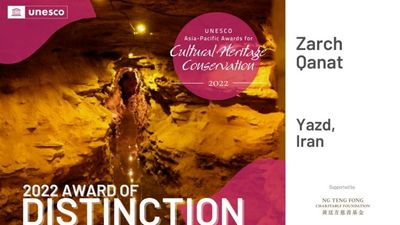Yazd’s Sadoughi House received the Award of Merit and Zarch Qanat won the Award of Distinction during a ceremony held in Thailand.
The historical house, dating back to more than 300 years ago, was mended a while back and now is called the Cultural House of Shahid Sadoughi.
The Qajar-era house is constructed based on architectural style of Yazd with clay and mud materials. Its thick clay walls that act as heat and cold insulation and provide the residents with pleasant air in summer and warm air in winter.
Dating back to the pre-Islamic Era, the Zarch Qanat is the longest one in Iran and the world. It is the life-giving artery of Zarch city in Yazd. It made the area habitable by providing the desert-crucial element of water to the people and farmers.
The Zarch Qanat is a plain one with a length of 100km. Its mother well is 90 meters deep and has more than 2,000 well shafts. Zarch is a city located 15km west of Yazd in central Iran.
At the 40th UNESCO World Heritage Summit held in Istanbul in July 2016, the Zarch Qanat, along with 10 other Iranian qanats, was registered on the World Heritage List.
“The awards are able to give people a sense of pride and ownership of their own heritage. It is encouraging to see the increased number of entries received this year, given that we are still in recovery period from the global COVID-19 pandemic. This year’s submissions have once again brought up interesting discussions regarding the trends in cultural heritage in the Asia-Pacific region. We are seeing a greater attention to cultural landscapes including heritage infrastructure systems that are very compatible with a sustainable development approach to our cities and rural areas.” said Chief of Culture Unit at UNESCO Bangkok Feng Jing.
Thirteen projects from six countries – Afghanistan, China, India, Iran, Nepal, and Thailand – have been acknowledged for awards by an international jury in this year’s awards program. Jury deliberations were carried out in November 2022, when members reviewed a total of 50 entries from 11 countries across the Asia-Pacific region.
The UNESCO Asia-Pacific Awards for Cultural Heritage Conservation has been supported by a partnership between UNESCO and Ng Teng Fong Charitable Foundation since 2021. Under this strategic partnership, Ng Teng Fong Charitable Foundation is supporting five awards cycles (2021–2025) and an accompanying series of specially tailored capacity-building activities amplifying the regional impact of the awards program.
Under this partnership, the 2022 award winners were publicized through the international symposium, ‘The Next Fifty Years: Challenges and Opportunities for World Heritage’ (26-27 November 2022), which celebrates the 50th anniversary of the 1972 Convention concerning the Protection of the World Cultural and Natural Heritage.
Awarded projects, to date, demonstrate various conservation criteria, such as the articulation of the spirit of place, technical achievement, appropriate use or adaptation, the project’s engagement with the local community, and the project’s contribution to enhancing the sustainability of the surrounding environment and beyond.
Source: Irna Daily

